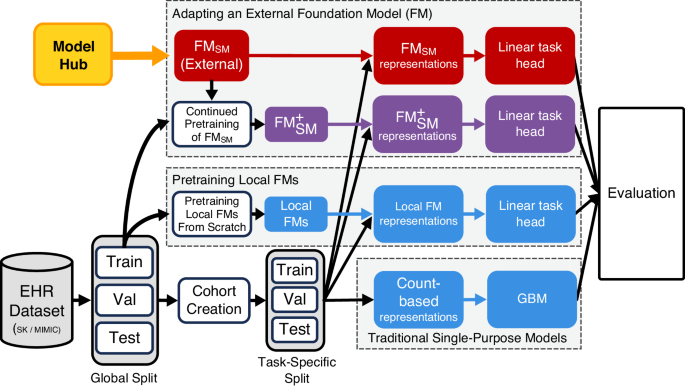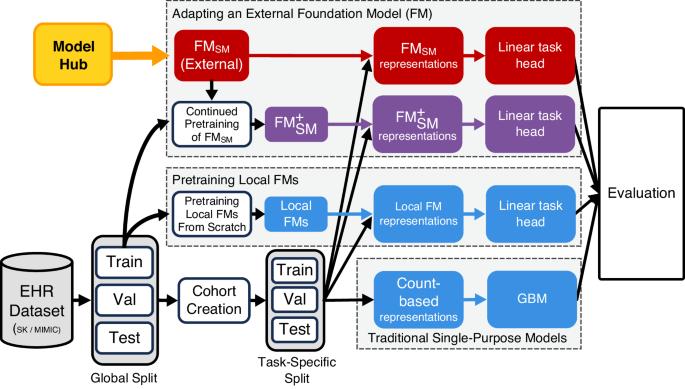关于电子病历共享基础模型适应性的多中心研究
IF 12.4
1区 医学
Q1 HEALTH CARE SCIENCES & SERVICES
引用次数: 0
摘要
基础模型通过提供可适用于各种下游任务的模块化组件,使人工智能开发更具可扩展性和成本效益,从而改变了医疗保健领域的人工智能(AI)。用于结构化电子健康记录(EHR)的基础模型是在数百万患者的编码医疗记录上训练出来的,其优点包括用更少的训练标签提高了性能,并改善了对分布变化的稳健性。然而,跨医院共享这些模型的可行性及其在本地任务中的表现仍存在疑问。这项多中心研究考察了可公开访问的结构化电子病历基础模型(FMSM)的适应性,该模型是在斯坦福大学医学院的 257 万份患者记录上训练出来的。实验使用了病童医院(SickKids)和重症监护医疗信息中心(MIMIC-IV)的电子病历数据。我们评估了通过本地数据持续预训练的适应性,以及与从头开始本地训练模型(包括本地基础模型)的基线相比的任务适应性。对 8 项临床预测任务的评估结果表明,对现成的 FMSM 进行调整后,其性能与在所有数据上进行本地训练的梯度提升机(GBM)相当,而在特定任务训练标签较少的情况下,其性能提高了 13%。继续在本地数据上进行预训练显示,FMSM 只需要不到 1% 的训练示例就能达到完全训练过的 GBM 的性能,而且比从头开始训练本地基础模型节省 60% 到 90% 的样本。我们的研究结果表明,在不同医院间调整电子病历基础模型能以更低的成本提高预测性能,这凸显了基础模型作为模块化组件在简化医疗人工智能开发方面的实用性。本文章由计算机程序翻译,如有差异,请以英文原文为准。


A multi-center study on the adaptability of a shared foundation model for electronic health records
Foundation models are transforming artificial intelligence (AI) in healthcare by providing modular components adaptable for various downstream tasks, making AI development more scalable and cost-effective. Foundation models for structured electronic health records (EHR), trained on coded medical records from millions of patients, demonstrated benefits including increased performance with fewer training labels, and improved robustness to distribution shifts. However, questions remain on the feasibility of sharing these models across hospitals and their performance in local tasks. This multi-center study examined the adaptability of a publicly accessible structured EHR foundation model (FMSM), trained on 2.57 M patient records from Stanford Medicine. Experiments used EHR data from The Hospital for Sick Children (SickKids) and Medical Information Mart for Intensive Care (MIMIC-IV). We assessed both adaptability via continued pretraining on local data, and task adaptability compared to baselines of locally training models from scratch, including a local foundation model. Evaluations on 8 clinical prediction tasks showed that adapting the off-the-shelf FMSM matched the performance of gradient boosting machines (GBM) locally trained on all data while providing a 13% improvement in settings with few task-specific training labels. Continued pretraining on local data showed FMSM required fewer than 1% of training examples to match the fully trained GBM’s performance, and was 60 to 90% more sample-efficient than training local foundation models from scratch. Our findings demonstrate that adapting EHR foundation models across hospitals provides improved prediction performance at less cost, underscoring the utility of base foundation models as modular components to streamline the development of healthcare AI.
求助全文
通过发布文献求助,成功后即可免费获取论文全文。
去求助
来源期刊

NPJ Digital Medicine
Multiple-
CiteScore
25.10
自引率
3.30%
发文量
170
审稿时长
15 weeks
期刊介绍:
npj Digital Medicine is an online open-access journal that focuses on publishing peer-reviewed research in the field of digital medicine. The journal covers various aspects of digital medicine, including the application and implementation of digital and mobile technologies in clinical settings, virtual healthcare, and the use of artificial intelligence and informatics.
The primary goal of the journal is to support innovation and the advancement of healthcare through the integration of new digital and mobile technologies. When determining if a manuscript is suitable for publication, the journal considers four important criteria: novelty, clinical relevance, scientific rigor, and digital innovation.
 求助内容:
求助内容: 应助结果提醒方式:
应助结果提醒方式:


